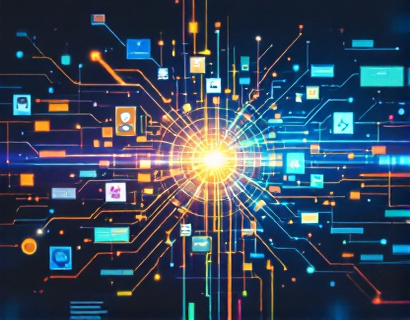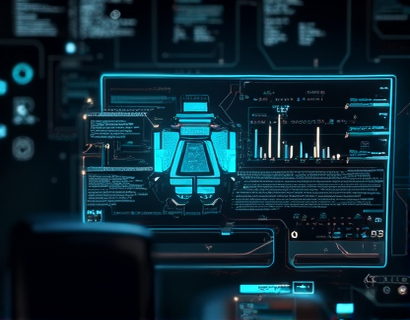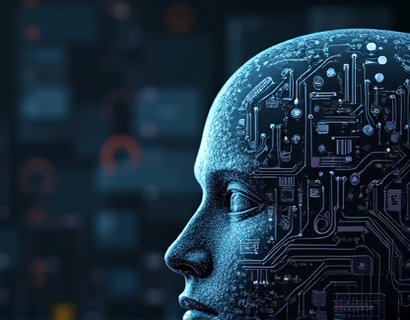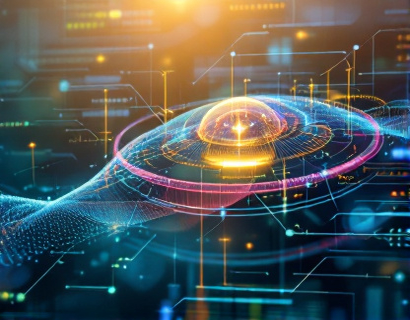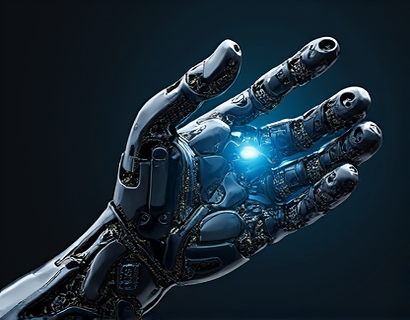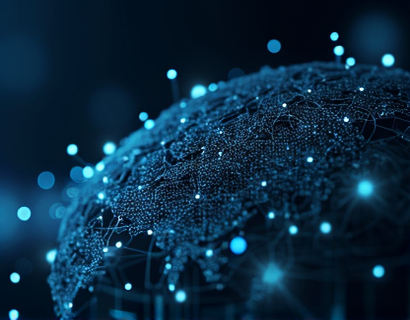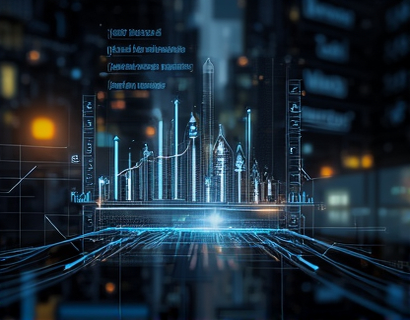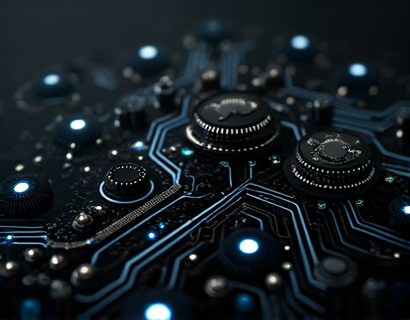AI and Crypto Synergy: Transforming Digital Productivity with Next-Gen Solutions
The intersection of artificial intelligence (AI) and cryptocurrency is giving rise to a new era of digital innovation, one that promises to revolutionize how we approach productivity and manage complex tasks. This synergy is not just a technological curiosity but a practical solution that enhances efficiency, security, and accessibility in the digital realm. As we delve into this topic, we will explore how the combination of AI and cryptocurrency is reshaping the landscape of digital productivity, offering insights that are invaluable for tech enthusiasts and professionals alike.
The foundation of this transformation lies in the unique properties of blockchain technology, the underlying infrastructure of cryptocurrencies. Blockchain's decentralized, transparent, and immutable nature provides a robust framework for building trust and security in digital transactions. When AI is integrated into this ecosystem, the potential for innovation becomes immense. AI can process vast amounts of data, identify patterns, and make predictions with a level of accuracy and speed that is unmatched by traditional methods. This capability is particularly useful in optimizing blockchain operations, enhancing smart contract functionality, and improving user experiences in decentralized applications (dApps).
One of the key areas where AI and cryptocurrency converge is in the realm of decentralized finance (DeFi). DeFi platforms leverage blockchain to offer financial services such as lending, borrowing, and trading without intermediaries. AI algorithms can significantly enhance these platforms by providing more accurate risk assessments, personalized financial advice, and automated trading strategies. For instance, AI-driven bots can analyze market trends and execute trades at optimal times, reducing human error and increasing profitability. This not only simplifies financial tasks but also makes them more accessible to a broader audience.
Another significant application of AI in the crypto space is in the area of security. Cryptocurrencies and blockchain technology are often associated with high levels of security, but they are not immune to threats such as hacking and fraud. AI can play a crucial role in detecting and mitigating these risks. Machine learning models can monitor transaction patterns and identify anomalies that may indicate malicious activity. By continuously learning from new data, these models become more effective over time, providing a dynamic and adaptive security layer. This is particularly important as the value of cryptocurrencies continues to rise, making them a more attractive target for cybercriminals.
The integration of AI and cryptocurrency also extends to the development of decentralized identity management systems. Traditional identity verification processes are centralized, vulnerable to breaches, and often cumbersome for users. AI-powered decentralized identity solutions can offer a more secure and user-friendly alternative. These systems use blockchain to store identity data in a tamper-proof manner, while AI algorithms can verify identities through biometric data or behavioral patterns. This not only enhances security but also gives users greater control over their personal information, reducing the need for multiple centralized identity providers.
In the context of digital productivity, AI and cryptocurrency can collaborate to create more efficient and user-centric tools. For example, AI-driven virtual assistants can be powered by blockchain to ensure data privacy and ownership. These assistants can manage schedules, reminders, and task lists, all while storing and processing data on a decentralized network. This approach not only enhances security but also ensures that users retain full control over their data, a critical aspect in an era where data privacy is increasingly paramount.
Smart contracts, a cornerstone of blockchain technology, can be further enhanced with AI to automate complex business processes. Traditional smart contracts are limited to predefined conditions and actions, but AI can add a layer of intelligence that allows for more dynamic and adaptive contract execution. For instance, an AI-enhanced smart contract could adjust payment terms based on real-time market data or automatically trigger actions based on predictive analytics. This level of sophistication can streamline operations, reduce manual intervention, and minimize the risk of errors.
The synergy between AI and cryptocurrency is also driving advancements in supply chain management. Blockchain provides a transparent and traceable ledger for tracking goods from production to delivery, while AI can optimize every step of the process. AI algorithms can predict demand, optimize inventory levels, and identify bottlenecks in the supply chain. When combined with blockchain, this creates a system that is not only transparent but also highly efficient and responsive to changing conditions. This is particularly beneficial for global supply chains, where coordination and transparency are crucial for success.
In the realm of content creation and distribution, AI and cryptocurrency are transforming the way creators monetize their work. Blockchain-based platforms can ensure that content creators receive fair compensation for their work, with AI helping to manage royalties and copyrights. AI can analyze content trends, suggest optimal distribution strategies, and even generate personalized content recommendations for users. This not only enhances the creator's revenue potential but also improves the user experience by providing more relevant and high-quality content.
The healthcare sector is another area where the combination of AI and cryptocurrency can bring about significant improvements. Blockchain can secure patient data and ensure compliance with regulations, while AI can analyze medical data to provide insights for diagnosis and treatment. AI-powered chatbots and virtual assistants can offer personalized health advice and monitor patient conditions in real-time, all while maintaining strict privacy standards. Cryptocurrency can facilitate seamless and secure transactions for healthcare services, reducing administrative overhead and improving patient care.
Education is yet another field that stands to benefit from the AI-crypto synergy. Blockchain can provide a secure and transparent way to issue and verify digital credentials, while AI can personalize learning experiences based on individual student needs. AI-driven educational platforms can adapt to a student's learning pace, provide real-time feedback, and suggest additional resources. Cryptocurrency can be used to reward students and educators, creating a more motivating and equitable learning environment.
As we explore the potential of AI and cryptocurrency, it's important to consider the challenges and considerations that come with this innovative combination. One of the primary challenges is the regulatory landscape. Both AI and cryptocurrency are still evolving fields, and regulations are often lagging behind technological advancements. This can create uncertainty for businesses and developers looking to implement these technologies. However, as the benefits become more apparent, we can expect to see more clear and supportive regulatory frameworks emerge.
Another consideration is the technical complexity involved in integrating AI and blockchain. Developing systems that seamlessly combine these technologies requires expertise in both domains. However, the growing number of interdisciplinary teams and open-source projects is helping to bridge this gap. As more resources become available, the barrier to entry for developers and businesses will continue to decrease, fostering greater innovation and adoption.
Privacy and security remain top concerns, especially when dealing with sensitive data. While blockchain and AI offer robust security features, the responsible use of these technologies is crucial. Ensuring that data is handled ethically and transparently is essential for building trust and widespread adoption. This includes implementing strong data governance practices and adhering to privacy regulations such as GDPR.
Looking to the future, the synergy between AI and cryptocurrency is poised to drive even more transformative changes. As AI algorithms become more advanced, their ability to process and analyze data from blockchain networks will continue to grow. This could lead to the development of more sophisticated decentralized applications, enhanced security protocols, and innovative business models. The potential for cross-industry collaboration is vast, with sectors such as finance, healthcare, education, and supply chain all standing to gain from this technological fusion.
In conclusion, the combination of AI and cryptocurrency is not just a technological novelty but a powerful force for digital transformation. By leveraging the strengths of both domains, we can create more secure, efficient, and user-friendly digital solutions. For tech enthusiasts and professionals, this synergy represents a exciting frontier filled with opportunities for innovation and growth. As we continue to explore and develop these technologies, the future of digital productivity looks brighter and more promising than ever.






